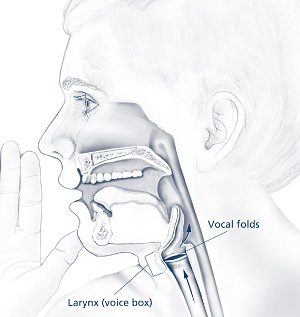Contents
Dysphonia: all you need to know about this voice disorder
Dysphonia is a voice disorder that can affect its intensity, pitch and timbre. It can have several explanations. Dysphonia can in particular be of inflammatory, traumatic, tumoral or nervous origin.
Definition: what is dysphonia?
Dysphonia is a spoken voice disorder that can be characterized by:
- a change in the intensity of the voice, with a weaker voice in dysphonic people;
- a change in the pitch of the voice, with a deeper voice in women or a higher pitched voice in men;
- a change in the tone of the voice, with a hoarse, muffled or hoarse voice.
Depending on the case, dysphonia can present:
- a sudden or gradual onset ;
- more or less discomfort.
The special case of spasmodic dysphonia
Spasmodic dysphonia is a specific voice disorder that occurs most often in people between the ages of 45 and 50. It results in spasms of the vocal cords. The causes of spasmodic dysphonia are not yet understood. According to certain hypotheses, it would seem that this voice disorder is of psychological or neurological origin. No organic lesions were identified in people with spasmodic dysphonia.
Explanation: what are the causes of dysphonia?
Dysphonia is caused by an alteration in the vibration of the vocal cords. It usually occurs when the larynx (an organ of the respiratory system located in the throat) or vocal cords are damaged, inflamed or discomfort. Several causes of dysphonia have been identified:
- inflammations acute or chronic;
- tumors benign or malignant;
- different traumas, especially in the larynx;
- neurological disorders, due to the involvement of certain specific nerves.
Causes of inflammatory origin
In many cases, this voice disorder can be the consequence of a laryngitis, an inflammation that affects the larynx. Different forms of laryngitis can cause dysphonia:
- acute adult laryngitis, often of infectious or traumatic origin, which appears suddenly and lasts from a few days to a few weeks;
- chronic laryngitis which is mainly due to smoking but can also occur in the event of alcoholism, irritation by steam or dust, vocal overexertion, pharyngeal infections or repeated nasal sinus infections;
- specific laryngitis, rare inflammations of the larynx, including laryngeal tuberculosis, laryngeal syphilis, laryngeal sarcoidosis and laryngeal mycosis.
Causes of tumor origin
In some cases, dysphonia can be the result of tumors in the throat:
- benign tumors, such as glottic tumors and supraglottic tumors;
- malignant tumors, or throat cancers, such as cancer of the vocal cords, supraglottic cancer, or cancer of the subglottis.
Causes of traumatic origin
Dysphonia can be caused by various trauma to the larynx such as:
- external trauma to the larynx, especially during a contusion, fracture or dislocation;
- internal trauma to the larynx, in particular during a post-intubation granuloma (tumor of an inflammatory nature manifested following an intubation), or a crico-arytenoid arthritis (inflammation of the crico-arytenoid joints present in the larynx);
- the after-effects of partial laryngeal surgery.
Causes of neurological origin
Several neurological disorders can explain the appearance of dysphonia. These disorders include in particular:
- laryngeal palsy due to motor nerve damage, in particular in the event of postoperative lesions or a tumor in the thyroid, trachea or esophagus;
- diabetic neuropathies, which are complications of diabetes;
- le Guillain-Barré syndrome, an autoimmune disease that affects the peripheral nervous system;
- la multiple sclerosis, an autoimmune disease that affects the central nervous system;
- strokes of the brainstem.
Evolution: what are the consequences of dysphonia?
The consequences of dysphonia vary from case to case. In general, a dysphonic person experiences discomfort in verbal exchanges with difficulty speaking or being heard.
The course of dysphonia depends on its origin. This voice disorder can continue but can sometimes progress in the most serious cases.
Treatment: what to do in case of dysphonia?
In case of dysphonia, it is advisable, as far as possible, to put the vocal cords at rest. A medical consultation is particularly recommended when the voice disorder persists for more than a week.
The medical management consists in treating the cause of the dysphonia and limiting the risk of progression. Depending on the diagnosis, several treatments may be considered. In some cases, a phase of rest is enough to stop the dysphonia. In the most serious forms, surgery may be considered by an otolaryngologist.










